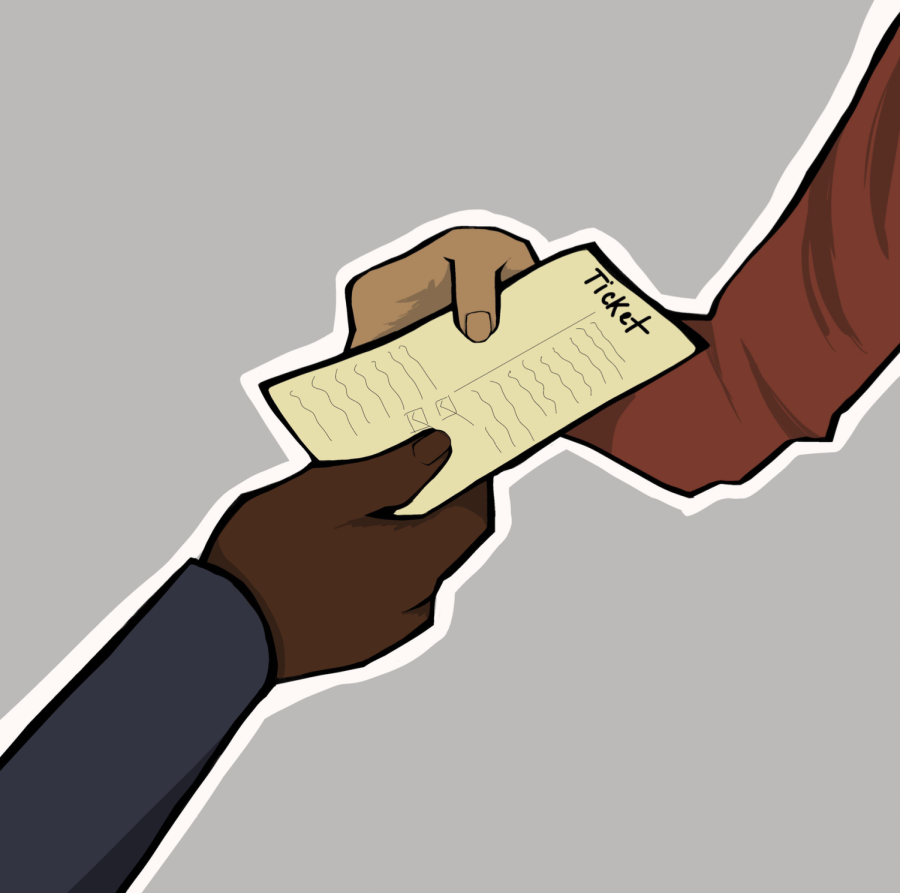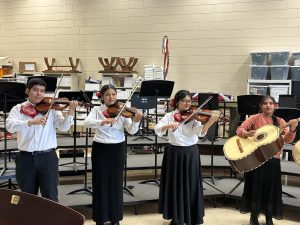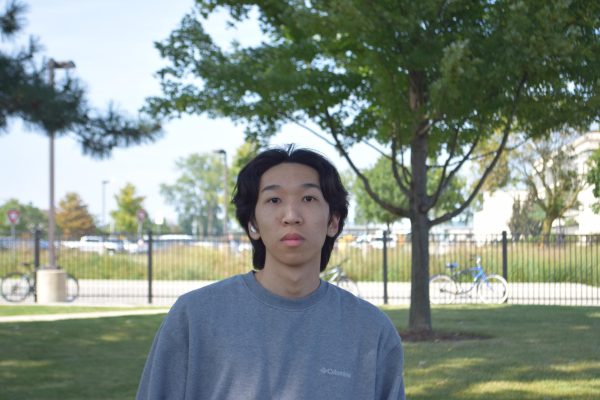Ticketing at Palatine High School: An in-depth look
May 9, 2023
Palatine high school student Jaqueline Chihuahua and her friend were caught skipping school in April of 2022. As a result of multiple truancies, a 200 dollar truancy ticket followed.
The ticket included a date where Chihuahua could appear in front of a judge to negotiate the fine on the ticket. After the hearing, Chihuahua was luckily able to make up her $200 fine with community service work. She would be picking up trash in front of the same police station that issued her the ticket.
After this incident, Chihuahua’s absences continued, eventually reaching 500 class truancies. The previous ticket did not seem to have an effect on her attendance. She then was fined with an additional $250 ticket, equating to about 24 hours of community service work. If Chihuahua didn’t complete the community service within the timeframe decided by the judge, she would be charged an additional $700.
According to Chihuahua, the decision to issue her ticket was up to the administrator, and the school resource officer merely accounted for the formalities in the paperwork.
School officials weren’t supposed to be administering the tickets. Even then, was the price of tickets fair for the crime? At the very least, were the tickets working?
Chihuahua was threatened with a third ticket to curb her absences, but she hid from administrators to avoid confrontation. Eventually, the school year ended. Chihuahua moved schools, and the ticket was not issued.
An investigation by ProPublic and the Chicago Tribune uncovered that there were racial disparities in how tickets were administered in District 211. The article mentioned how Palatine High School is one of the most diverse out of the schools investigated and was also cited with the most disparity in tickets.
“Even though I was a little frustrated by the article,” PHS Principal Tony Medina said. “I feel like it has made us re-examine how we respond to certain behaviors. Do I feel like issuing tickets changed a lot of behaviors? It didn’t.”
For PHS, the release of this article and the following message from the state superintendent of education, Carmen Ayala, began a re-examining of procedures at PHS.
The process of discipline
“From looking at the data from the previous school year, there was more intensity,” Fremd High School Assistant Principal Michael Smith said. “Not that there wasn’t a response, but you knew it was unexpected. There were no indicators that would have said there would be an increase in student conflict.”
According to Smith, District 211 as a whole has seen an increase in disciplinary conflicts as students fully came back from the pandemic e-learning. At Palatine High School, this resulted in new rules and policies.
Disciplinary situations specifically are handled by administrative staff and the school resource officers, SRO’s.
“That’s when we want to look at one side, what the restorative approaches can be and also if it is necessary,” Smith said. “For more punitive consequences, the intervention or consequences can work hand in hand. I’d say the majority of time, students will receive both.”
When a situation occurs, a team of administrators perform a thorough investigation. This includes reviewing security camera footage, interviewing all the students and staff involved in the conflict, and coming to a general consensus about why the conflict occurred. This may involve looking at the prior history of students and seeing if any other students are taking part in the behavior.
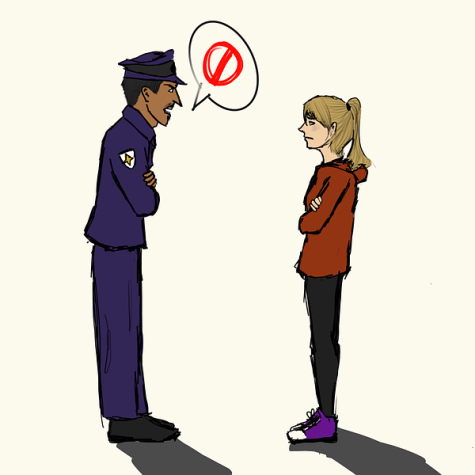
“It is not the first period of consequence that we assign a student,” Smith said. “It is after looking at the whole thing and evaluating. It is a resource, but not not the main resource.”
If the incident is causing a level of disruption in the building or has caused bodily harm to any student or staff, the option for issuing a police ticket enters the disciplinary plan.
“What we do as administrators is that we work in collaboration with our school resource officer to talk through the situation,” Smith said. “The resource officer does not dictate to us. It is rather a conversation amongst the administration and SRO.”
Police officers specifically handle the administering of tickets, but the process to recommend students for that is up to the administrative staff at Palatine.
“Our school resource officer actually kind of functions like another administrator,” Medina said. “We are more proactive with our responses. An SRO or school resource officer is much more reactive.”
According to Medina, there are specific laws that tell the administration when police must be involved in student incidents. Examples of these include drugs, battery and assault.
“It’s really the officer,” Medina said. “He makes the determination whether or not they issue the ticket. When there’s a major disruption to our learning environment that impacts everybody, we involve the school resource officer, and he determines whether or not it meets the threshold of whatever ticket that he feels it’s okay to be issued.”
According to Medina, the school does not press charges on behalf of students involved in student on student altercations. The student harmed can decide if they want to press charges, and the school resource officer would issue the ticket on their behalf.
“We want to get [the SRO] involved so he understands, and so he’s aware of what happens,” Medina said. “We can help both groups of students if there’s an altercation like that, and the officer makes the determination if it meets a threshold to issue a ticket. Then he determines whether or not it meets the threshold for disorderly conduct.”
The process for disciplinary action has changed over the years. Before the SRO was much more involved in every student incident, that has changed significantly over the passing of various laws.
“Us working with him and getting a perspective on logistical school safety is really important for us,” Medina said. “We’ve always had a good partnership and made sure the boundaries are set between police and school.”
Bound by the law
Senate Bill 100, which was officially effective Sept. 15 2016, clearly prohibits the use of monetary fines or fees as a means for schools to discipline students.
If a student has damaged, stolen, or lost property this bill doesn’t prevent them from providing money worth those goods.
The bill also introduces a method of ‘reciprocal reporting system’ between the school district and local enforcement, in addition to creating a memorandum of understanding of local enforcement’s role in schools.
SB100 also highly encourages the use of non-expulsionary methods of discipline over expelling students and states that school boards can not implement zero-tolerance policies for expulsions and suspensions. Specifically, the bill states that out of school suspensions must only occur if the students’ continued presence in the school would be either a threat or a disruption to the learning environment.
2012 Public Act 105 ILCS goes into more detail specifically about truancy. Barring out of school suspension, expulsions, or court action for students that are truant, unless the student has gotten 15 days worth of consecutive absences.
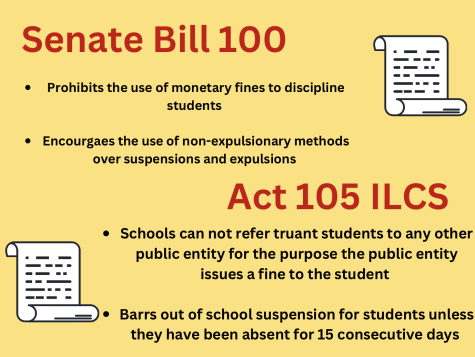
The school may only refer to the actions stated above if the school has provided the student with all supportive resources, and after going through every possible resource, can not get the student to return back to school.
Explicitly stated, schools can not refer the truant student to any other public entity, in an effort that the public entity issues a monetary fine or ticket to the student.
However, if schools have exhausted every supportive resource to the truant student, the schools can refer the guardian of the truant student to public entities in order a ticket or disciplinary fine be issued to the guardian.
Together, the purpose of these laws is to prevent schools from using fines, fees, and tickets to discipline students. Overall the trend for school districts has been to stray away from punitive measures of retribution, and have been putting the emphasis on supportive measures as opposed to punishments. This legislation sends the message that out of school suspensions, and expulsions should be a last resort when it comes to disciplining students.
Another Illinois law was passed in 2019 that prevented schools from referring students to law enforcement agencies so they could give the juvenile a ticket/monetary fine for general discipline, not just truancies.
Despite all these laws, Chihuahua was ticketed for truancy during the 2021-2022 school year.
Make up at PHS
According to ProPublica, 195 tickets were issued at PHS during the years of 2019, 2020, and 2021.
Tickets were issued for truancy, disorderly conduct, possessions or use of cannabis or cannabis related products, and possession and/or use of e-cigarettes. The most common reasons for ticketing in District 211 overall were truancy and use/possessions of e-cigarettes and vapes.
340 tickets were issued at PHS during the period of July 2018 through May 2021. 86 juvenile tickets were issued by the PHS SRO, officer Cohen. These tickets were issued from June 1, 2021 to about the middle of May 2022.
There is no way to determine from the data if tickets are counted twice for students that have gotten them multiple times. For Chihuahua, this shows how the tickets might be ineffective but are still rapidly being issued.
Even with the passing of SB100 law in 2015 and the additional one in 2019, the Palatine police department was able to ticket 25 juveniles for truancy to PHS students. These tickets were from June 2021 to May 2022. The highest fine out of these was for about $344.
This ticketing raises questions about the effectiveness of SB 100 and the additional laws. Despite its premise, student’s are still being punished with monetary fines, whether school administration is issuing those fines or not.
Out of the forty nine students surveyed regarding disciplinary policies at PHS, only about 27% knew about the monetary fines that were issued for behavioral issues.
Additionally, many students see existing administrative discipline procedures as acceptable punishments for misbehavior. These include things such as a lunch detention, phone call home, or revoking of off campus privileges.
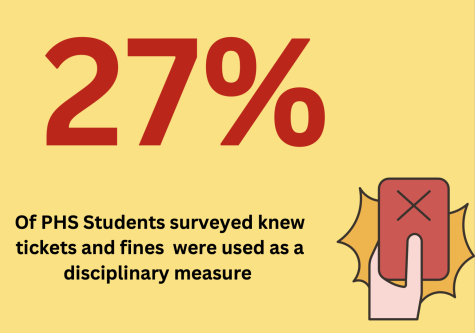
Other students do not know the most ‘fair’ punishment and realize that a holistic process is necessary. However, they do notice that current disciplinary procedures are not as effective as administrators would hope.
“It depends on what happens,” a student responded to the survey. “But unless a crime was committed, there should be no monetary fine placed on a student. Students are still maturing, and continuing to develop, grow and learn. Consequences can and should be dealt, but not monetary fines. A lot of students don’t have a source of income, so it isn’t fair to put a fine on them.”
District 211
According to Medina, the 2021-2022 school year saw an uptick in attendance related issues at PHS. This school year was also the year that schools were fully in-person.
“If you looked at data from all across the state of Illinois,” Medina said. “You would see something similar to us in terms of the rise of truancies and absences in general.”
From 2019 through 2021 568 disciplinary tickets were issued in district 211. At PHS, about 7.58% of the students have received a disciplinary ticket. Fremd has had .93% of their students receive a disciplinary ticket.
Both schools, just like others in the district, have begun re-examining their disciplinary policies.
With the breaking story from ProPublica, rising disciplinary conflicts all across the district, and increased investigations throughout the district, a change in ticketing procedures is currently being explored.



